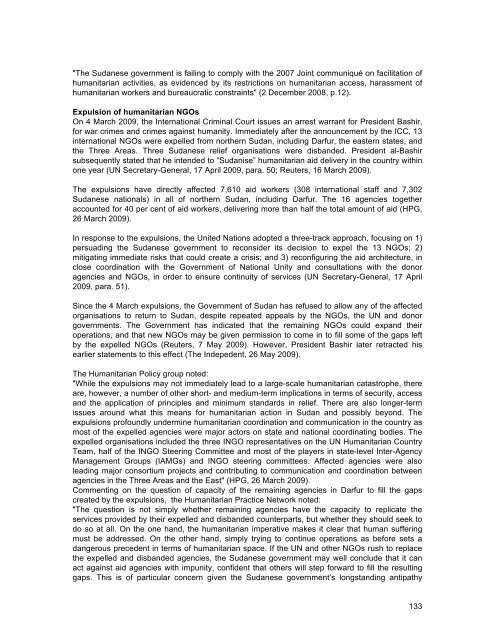SUDAN: Durable solutions elusive as southern IDPs return and ...
SUDAN: Durable solutions elusive as southern IDPs return and ...
SUDAN: Durable solutions elusive as southern IDPs return and ...
Create successful ePaper yourself
Turn your PDF publications into a flip-book with our unique Google optimized e-Paper software.
"The Sudanese government is failing to comply with the 2007 Joint communiqué on facilitation of<br />
humanitarian activities, <strong>as</strong> evidenced by its restrictions on humanitarian access, har<strong>as</strong>sment of<br />
humanitarian workers <strong>and</strong> bureaucratic constraints" (2 December 2008, p.12).<br />
Expulsion of humanitarian NGOs<br />
On 4 March 2009, the International Criminal Court issues an arrest warrant for President B<strong>as</strong>hir,<br />
for war crimes <strong>and</strong> crimes against humanity. Immediately after the announcement by the ICC, 13<br />
international NGOs were expelled from northern Sudan, including Darfur, the e<strong>as</strong>tern states, <strong>and</strong><br />
the Three Are<strong>as</strong>. Three Sudanese relief organisations were disb<strong>and</strong>ed. President al-B<strong>as</strong>hir<br />
subsequently stated that he intended to “Sudanise” humanitarian aid delivery in the country within<br />
one year (UN Secretary-General, 17 April 2009, para. 50; Reuters, 16 March 2009).<br />
The expulsions have directly affected 7,610 aid workers (308 international staff <strong>and</strong> 7,302<br />
Sudanese nationals) in all of northern Sudan, including Darfur. The 16 agencies together<br />
accounted for 40 per cent of aid workers, delivering more than half the total amount of aid (HPG,<br />
26 March 2009).<br />
In response to the expulsions, the United Nations adopted a three-track approach, focusing on 1)<br />
persuading the Sudanese government to reconsider its decision to expel the 13 NGOs; 2)<br />
mitigating immediate risks that could create a crisis; <strong>and</strong> 3) reconfiguring the aid architecture, in<br />
close coordination with the Government of National Unity <strong>and</strong> consultations with the donor<br />
agencies <strong>and</strong> NGOs, in order to ensure continuity of services (UN Secretary-General, 17 April<br />
2009, para. 51).<br />
Since the 4 March expulsions, the Government of Sudan h<strong>as</strong> refused to allow any of the affected<br />
organisations to <strong>return</strong> to Sudan, despite repeated appeals by the NGOs, the UN <strong>and</strong> donor<br />
governments. The Government h<strong>as</strong> indicated that the remaining NGOs could exp<strong>and</strong> their<br />
operations, <strong>and</strong> that new NGOs may be given permission to come in to fill some of the gaps left<br />
by the expelled NGOs (Reuters, 7 May 2009). However, President B<strong>as</strong>hir later retracted his<br />
earlier statements to this effect (The Indepedent, 26 May 2009).<br />
The Humanitarian Policy group noted:<br />
"While the expulsions may not immediately lead to a large-scale humanitarian cat<strong>as</strong>trophe, there<br />
are, however, a number of other short- <strong>and</strong> medium-term implications in terms of security, access<br />
<strong>and</strong> the application of principles <strong>and</strong> minimum st<strong>and</strong>ards in relief. There are also longer-term<br />
issues around what this means for humanitarian action in Sudan <strong>and</strong> possibly beyond. The<br />
expulsions profoundly undermine humanitarian coordination <strong>and</strong> communication in the country <strong>as</strong><br />
most of the expelled agencies were major actors on state <strong>and</strong> national coordinating bodies. The<br />
expelled organisations included the three INGO representatives on the UN Humanitarian Country<br />
Team, half of the INGO Steering Committee <strong>and</strong> most of the players in state-level Inter-Agency<br />
Management Groups (IAMGs) <strong>and</strong> INGO steering committees. Affected agencies were also<br />
leading major consortium projects <strong>and</strong> contributing to communication <strong>and</strong> coordination between<br />
agencies in the Three Are<strong>as</strong> <strong>and</strong> the E<strong>as</strong>t" (HPG, 26 March 2009).<br />
Commenting on the question of capacity of the remaining agencies in Darfur to fill the gaps<br />
created by the expulsions, the Humanitarian Practice Network noted:<br />
"The question is not simply whether remaining agencies have the capacity to replicate the<br />
services provided by their expelled <strong>and</strong> disb<strong>and</strong>ed counterparts, but whether they should seek to<br />
do so at all. On the one h<strong>and</strong>, the humanitarian imperative makes it clear that human suffering<br />
must be addressed. On the other h<strong>and</strong>, simply trying to continue operations <strong>as</strong> before sets a<br />
dangerous precedent in terms of humanitarian space. If the UN <strong>and</strong> other NGOs rush to replace<br />
the expelled <strong>and</strong> disb<strong>and</strong>ed agencies, the Sudanese government may well conclude that it can<br />
act against aid agencies with impunity, confident that others will step forward to fill the resulting<br />
gaps. This is of particular concern given the Sudanese government’s longst<strong>and</strong>ing antipathy<br />
133
















